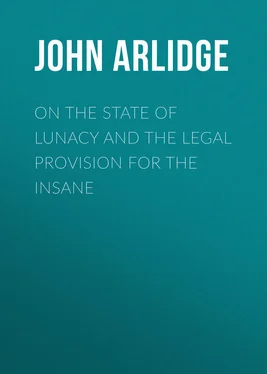John Arlidge - On the State of Lunacy and the Legal Provision for the Insane
Здесь есть возможность читать онлайн «John Arlidge - On the State of Lunacy and the Legal Provision for the Insane» — ознакомительный отрывок электронной книги совершенно бесплатно, а после прочтения отрывка купить полную версию. В некоторых случаях можно слушать аудио, скачать через торрент в формате fb2 и присутствует краткое содержание. ISBN: , Жанр: foreign_antique, foreign_prose, на английском языке. Описание произведения, (предисловие) а так же отзывы посетителей доступны на портале библиотеки ЛибКат.
- Название:On the State of Lunacy and the Legal Provision for the Insane
- Автор:
- Жанр:
- Год:неизвестен
- ISBN:http://www.gutenberg.org/ebooks/44320
- Рейтинг книги:3 / 5. Голосов: 1
-
Избранное:Добавить в избранное
- Отзывы:
-
Ваша оценка:
- 60
- 1
- 2
- 3
- 4
- 5
On the State of Lunacy and the Legal Provision for the Insane: краткое содержание, описание и аннотация
Предлагаем к чтению аннотацию, описание, краткое содержание или предисловие (зависит от того, что написал сам автор книги «On the State of Lunacy and the Legal Provision for the Insane»). Если вы не нашли необходимую информацию о книге — напишите в комментариях, мы постараемся отыскать её.
On the State of Lunacy and the Legal Provision for the Insane — читать онлайн ознакомительный отрывок
Ниже представлен текст книги, разбитый по страницам. Система сохранения места последней прочитанной страницы, позволяет с удобством читать онлайн бесплатно книгу «On the State of Lunacy and the Legal Provision for the Insane», без необходимости каждый раз заново искать на чём Вы остановились. Поставьте закладку, и сможете в любой момент перейти на страницу, на которой закончили чтение.
Интервал:
Закладка:
The number of Criminal Lunatics in asylums is noted in the returns, but that of those in jails is not reckoned. Although this is comparatively small, owing to the usual custom of transferring prisoners, when insane, to asylums, yet, at any one period, a proportion sufficient to figure in a calculation of the whole insane population of the country will always be found. Nay more, besides such scattered instances in County Prisons, there is a very appreciable number in the Government Jails and Reformatories, as appears from the returns presented to Parliament (Reports of the Directors of Convict Prisons, 1858.)
The prisons included in these reports are: – Pentonville, Millbank, Portland, Portsmouth, Dartmoor, Parkhurst, Chatham, Brixton, Fulham Refuge, and Lewes. In the course of 1857, 216 persons of unsound mind were confined, some for a longer or shorter period, others for the whole of the year, in one or other of those prisons. Making allowance for those of the 216 who by removal from one prison to another (a transfer apparently of common occurrence, the rationale of which we should find it difficult to explain), might be reckoned twice, it may be safely stated that at least 150 were in the prison-infirmaries in question the whole year. In fact, the Infirmary of Dartmoor Prison has wards specially appropriated to insane patients, and actually constitutes a criminal asylum of no insignificant magnitude. For instance, the report tells us that on the 1st of January, 1857, there remained in that prison 102 cases; that 41 were received during the year; 37 discharged (where, or how, we are not told, except of 3, who were sent to Bethlem Hospital); and 106 remained on the 1st of January 1858.
It is also worth noting that in this Dartmoor Prison Infirmary, 38 epileptics remained on January 1st, 1857; 22 were admitted, 13 discharged, and 47 remained on January 1st, 1858. The total of epileptics coming under notice in the infirmaries of the several prisons in question, in the course of 1857, amounted to 135. The remarks on some of these cases of epilepsy by the medical officers, are sufficient to show that the convulsive malady has seriously affected the mental health, and that they might rightly be placed in the category of the insane.
However, having no wish to enhance the proportion of the subjects for Lunatic Asylums, we will deal only with those enumerated as mentally disordered. These amounted, according to the preceding calculations, in the Government Prisons, to 150, and it would seem no exaggerated estimate to assert that an equal number may be found in the various other prisons and reformatories throughout the country. To put the matter in another form, 300 lunatics are to be found in English prisons at any date that a census may be taken. Consequently this sum of 300 must be added in calculating the total of insane persons in this kingdom.
To establish still further the proposition with which we set out, that our public statistics of Insanity are incomplete, the history of every County Asylum might be adduced: for, notwithstanding very considerable pains have been taken, on the proposition to build a new asylum, to ascertain the probable number of claimants, and a wide margin over and above that estimate has been allowed in fixing on the extent of accommodation provided, yet no sooner has the institution got into operation, than its doors have been besieged by unheard-of applicants for admission, and within one-half or one-third of the estimated time, its wards have been filled and an extension rendered imperative. Such is a résumé of the general history of English County Asylums, attested in the strongest manner by that of the Middlesex, the Lancashire, and the Montgomery Asylums; and confirmatory of the fact of the augmentation of insanity in the country at a rate exceeding, more or less, that collected from county returns and public statistics. It is, moreover, to be observed, that the official statistics represent the total of lunatics existing on one particular day, usually the first of January, in each year, and take no account of those many who are admitted and discharged within the year, and who rightly should be reckoned in an estimate of the total number of the insane belonging to that period.
The average daily number resident in asylums would be a more correct representation of their insane population than the total taken on any one day, although it would fail to show the lunacy of the year.
Lastly, to illustrate the point discussed, to indicate how imperfect our present estimate of the prevalence of insanity most probably is, and to show the difficulties and defects of any ordinary census, we may appeal to the experience of the special commission charged by the legislature of Massachusetts to examine the statistics of Lunacy and the condition of Asylums in that State, as recorded in their report, published in 1855.
“In 1848” (they write, p. 18), “a committee of the Legislature, appointed to ‘consider the whole subject connected with insanity within the commonwealth,’ ascertained and reported the number of insane in this State to be 1512, of whom 291 were able to furnish the means of their own support, and 1156 were unable to do so, and the pecuniary condition of 65 was not ascertained.
“In making that survey in 1848, the Commissioners addressed their letters of inquiry ‘to the municipal authorities of every city and town in the commonwealth.’
“These public officers had direct means of knowing the number and condition of the pauper insane, and probably this part of the report was complete; but they had no other facilities of knowing the condition of those lunatics who were in private families, and supported by their own property or by their friends, than other men not in office, and could only speak of those who were within their circle of personal acquaintance. Consequently the report included only a part of the independent insane who were then actually in, or belonged to, the State.”
“In 1850 (p. 11), the marshals, the agents of the national government who were appointed to take the census, visited every family; and, among other items of information, they asked for the insane and idiots in the household.
“By this personal and official inquiry, made of some responsible member of every family, the marshals obtained the account of only 1680 insane persons and 791 idiots, which is but little more than two-thirds of the number ascertained by this Commission.
“Making all due allowance for the increase of population, and consequently of the insane and idiots, these figures undoubtedly show far less than the real amount of lunacy and idiotcy at that time, and render it extremely probable that many concealed the facts that the law required them to state to the marshals.”
Thus the marshals discovered the number of insane to be in 1850 nearly double that returned in 1848, and from their apparently searching inquiry, it might have been presumed that they had made a near approximation to the truth in the figures they published. However, the most pains-taking and varied investigations of the Special Commissioners in 1854, prove the marshals to have much underrated the number, for the result arrived at was, that in the autumn of the year just named, there were 3719 lunatics, of whom 1087 were idiots, in the State of Massachusetts.
The partial explanation of the divergence in numbers, viz.: – “that it is probable that many of the families refused or neglected to report to the marshals the insane and idiots who were in their households,” – is of itself an indication of one of the impediments to a correct enumeration of the insane members of a community, even when such is attempted under favourable circumstances. It is one likewise which, however operative in the United States, where the public asylums are open to, and resorted to by, all classes of the community, must be still more so in this country, where family pride endeavours in every way to ignore and keep secret the mental affliction of a member, as though it were a plague spot. Besides this, in no English census yet taken, has the enumeration of the insane constituted a special subject of inquiry.
Читать дальшеИнтервал:
Закладка:
Похожие книги на «On the State of Lunacy and the Legal Provision for the Insane»
Представляем Вашему вниманию похожие книги на «On the State of Lunacy and the Legal Provision for the Insane» списком для выбора. Мы отобрали схожую по названию и смыслу литературу в надежде предоставить читателям больше вариантов отыскать новые, интересные, ещё непрочитанные произведения.
Обсуждение, отзывы о книге «On the State of Lunacy and the Legal Provision for the Insane» и просто собственные мнения читателей. Оставьте ваши комментарии, напишите, что Вы думаете о произведении, его смысле или главных героях. Укажите что конкретно понравилось, а что нет, и почему Вы так считаете.












